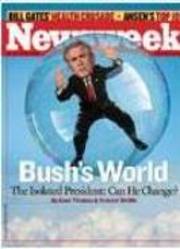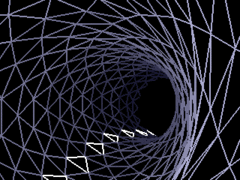People who hate George W. Bush often make the mistake of thinking he is stupid.
I have argued here that he is, in fact, trapped in time. He has lived and internalized the assumptions of the Nixon Thesis to such an extent that he can’t see any other path. So he just goes forward, even after his most ardent supporters have turned the other way.
Easy to ridicule. But Bush lives inside a political world, and that I assert is why he has such tunnel vision. Those who are successful in other realms do much the same thing.
Take TV and cable networks. CBS posts its videos on YouTube, but demands that users who post the same videos take them down. Why? Tunnel vision. They are agents for the producers of TV shows. The exclusive agent. They can’t conceive of an "economics of abundance" where the key to getting an audience is through endorsements, Google Love. When a dozen or 100 people go to the trouble of posting the same Jon Stewart Video on YouTube, this grows CBS’ online audience far more than CBS posting the same videos on every video Web site would, because of the endorsement value.
Back in Washington, bloggers are constantly amazed at how paid pundits will ignore their own prior writings and self-righteously condemn anyone who comes to town with new ideas. No responsibility is accepted for having enabled stupidity. As Josh Marshall notes, "This is noxious, risible, fetid thinking. But there it is. That’s the
story they want to tell. The whole place is rotten down to the very
core."
My point is that it’s not rotten, it’s human, it’s a tunnel vision world.
You specialize in one subject all your life. You know only one set of
assumptions for how things should proceed. When anything comes along
that contradicts your worldview, you are unable to question yourself as
you do others.
In business, the answer to such Cluelessness is called failure. New
companies replace the old ones, carrying new assumptions with them.
Think of it as evolution in action. The same in politics, and in the
media. Turnover is a partial answer to Cluelessness, but understand
that you’re just replacing one set of assumptions with another, and
when these fail (as they will when circumstances change) you will need
to change again.
This is why the "generational thesis" I have written about here so
often works. As theories are validated by events, they become
ingrained. They become an "establishment," they become asssumptions which cannot adapt when the
problems are different, requiring different assumptions.
The real problem we face is environmental. New Orleans is merely the first example of many,
forcing us to choose between the abandonment of what we treasure and
the necessity of change. The relative poverty of New Orleans — its
elite is middle class, and its landed wealth is controlled from outside
— made it easy for business and government to abandon it.
But what if next time it’s Hilton Head Island? Or St. Simon’s Island?
Or Sarasota? What if the next New Orleans happens in a place occupied by
those accused of wealth, guilty of education, locally invested?
Because it will.
What we need to do is change our worldview, the assumptions that
underly our media, our politics, and our business decision-making.
Events don’t just overwhelm the poor, they overwhelm anyone whose
assumptions are too fixed.
That’s the Bush Effect in action.












